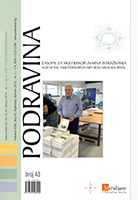- IN MEMORIAM AKADEMIK DRAGUTIN FELETAR (1941. – 2023.) - POKRETAČ, GLAVNI I ODGOVORNI UREDNIK ZNANSTVENOG ČASOPISA PODRAVINA, SVESTRANI GEOGRAF I PROSVJETITELJ
- IN MEMORIAM: MOJE SJEĆANJE NA AKADEMIKA DRAGUTINA FELETARA
- IN MEMORIAM: MENTORJU AKADEMIK PROFESOR DR. SC. DRAGUTIN FELETAR
- IN MEMORIAM: SJEĆANJE NA PROFESORA DRAGUTINA FELETARA
- IN MEMORIAM: FELETAR NAM JE DOKAZAO DA SE DO USPJEHA DOLAZI ISKLJUČIVO MUKOTRPNIM RADOM, TALENTOM I UPORNOŠĆU
- IN MEMORIAM: VERBA VOLANT, SCRIPTA MANENT!
- PREKODRAVLJE U SREDNJEM VIJEKU
- FIREARMS WITH THE ZRÍNYI COAT OF ARMS
- THE DEVELOPMENT OF PROFESSIONAL GAME MANAGEMENT AND HUNTING TOURISM ALONG THE RIVER OF DRAVA
- PRILOG POZNAVANJU ZBIVANJA NA PODRUČJU OPĆINA VIRJE I ŠEMOVCI U VRIJEME DRUGOGA SVJETSKOG RATA (1941. – 1945.)
- SUVREMENI MIGRACIJSKI PROCESI IZMEĐU KOPRIVNICE I SAVEZNE REPUBLIKE NJEMAČKE
- RAZLIKE U REGIONALNOJ POLITIČKO-GEOGRAFSKOJ PERCEPCIJI NA PRIMJERU MEĐIMURJA I PODRAVINE
- POVEZANOST DEMOGRAFSKIH OBILJEŽJA I OBILJEŽJA TIPOVA I UZORAKA KRAJOLIKA VARAŽDINSKOG KRAJA – PRIMJENA KORELACIJSKE ANALIZE
- ANALIZA UTJECAJA INTRAPERSONALNE KOMUNIKACIJE NA EMOCIJE STUDENATA SVEUČILIŠTA SJEVER PUTEM UPITNIKA EMOCIONALNE REGULACIJE I KONTROLE (ERIK)
- PRIKAZI NOVIH KNJIGA, ČASOPISA I ZNANSTVENIH SKUPOVA
THE DEVELOPMENT OF PROFESSIONAL GAME MANAGEMENT AND HUNTING TOURISM ALONG THE RIVER OF DRAVA
In my study I examine the peculiarities of hunting activities that fit into the forest management system of the South Transdanubian estates during the period of dualism (1867–1918). I present the forestry and hunting characteristics of the estates in the area. The South Transdanubian region has always been famous for its high-quality wildlife, which has had lasting results. The hunts were simultaneously gentlemanly entertainments for the higher social strata, special forms of communal existence, social gatherings, which at the same time created an opportunity to build relationships among the participants. Hunts could not do without the development of conscious game management. During the period under study, efforts were made to develop game management in several estates. The aristocratic landowners were interested in introducing more and more huntable game species on their lands. Famous hunting grounds and hunting gardens were established. In many places, significant capital was invested in the construction of hunting lodges. A lot of energy was also put into building hunting facilities and related infrastructure. The development of game management required trained and well-paid agricultural professionals. In my study, I highlight the fact that the foundations of today’s most significant hunting facilities and systems were laid in the estates of the perio
Izvorni znanstveni rad / Original scientific paperMáté SZABÓ

